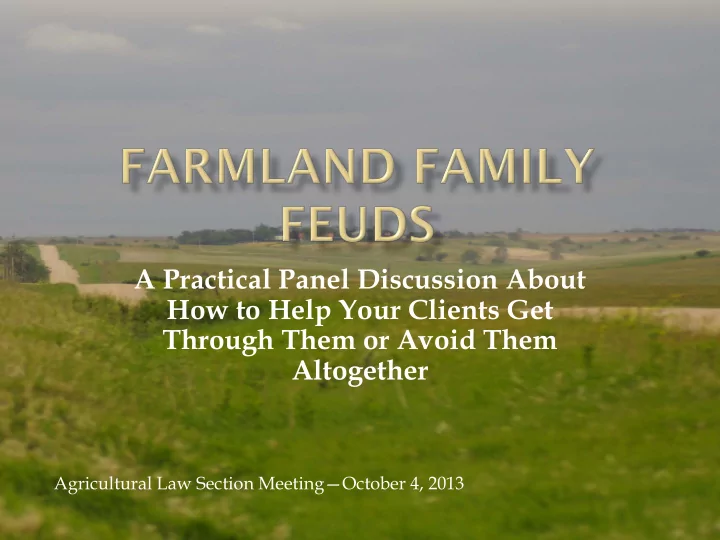

A Practical Panel Discussion About How to Help Your Clients Get Through Them or Avoid Them Altogether Agricultural Law Section Meeting—October 4, 2013
• Christin P. Lovegrove--Heinisch & Lovegrove, PC, LLO • Geneva, Nebraska • christin@hllawoffice.com • David L. Bracht--Stinson Morrison Hecker LLP • Omaha, Nebraska • dbracht@stinson.com • Dan L. Lindstrom—Jacobsen, Orr, Lindstrom & Holbrook, PC LLO • Kearney, Nebraska • dlindstrom@jonlaw.com
Old and outdated estate plans that do not reflect current circumstances. C-Corporation never converted to S-Corporation Division of land in kind resulting in nonsensical configurations Failure to adjust to new land values Focus on taxation avoidance at the expense of common-sense succession planning. Inertia: Failed to act when Dad and Mom were alive. No viable exit strategy for heirs.
Problems With The “Equal is Fair” Approach: Fails to protect “THE FARMER” • Ranch or Farm given to heirs who neither understand it nor care about it • Reflects failure to communicate a direction and a plan • GREED: “It’s my money and I want it now” mentality •
There will often be at least one “Stinker” in the bunch….
“Equal Is Fair?” Dad dies suddenly at age 65, leaving all of his interest in the farm property to Mom. Mom is not engaged in the operation of the farm and doesn’t want to be. They have four children, one of whom has farmed with Dad for over 20 years. Besides emotional attachment to the land, and the fleeting “wannabe a farmer” moments, the other three siblings are otherwise not involved or interested in the farm. Mom is conflicted about what to do. She has alternative thoughts: Just leave everything to the four kids in equal shares, because that’s fair, and • they’ll all get along.” OR “My goal is to perpetuate this farm by making sure that my son, The Farmer, • gets the best chance that he can to carry on the family farming operation.” OR “I’m selling the whole thing to the highest bidder as soon as I can because this • farm killed Dad and I’ll be damned if I’ll watch it kill my son.”
“Mom Always Liked You Better.” Same as above, but Mom agonizes for years about what to do, changing her mind several times. At some point later in life, her health deteriorates, confusion or dementia sets in, and one or more of the siblings convinces her that she should change her estate plan again because: “The Farmer is taking advantage of you by paying you below market rents, • wasting your assets, not taking care of you the way I/we do, etc., so show us that you love us more than that sidewinder....” “The way things have changed in value, don’t you feel guilty for giving The • Farmer more than his fair share?” OR “Since he is already in his 60's, you need to cut The Farmer out and instead • rent/give/sell the land to nephew or grandson so that he can get started in farming.”
“Now What Do We Do?” Of the four heirs to Mom’s estate, none of them are going to be a farmer and they all live in the big city. In typical equal is fair fashion, Mom just leaves it to all four as tenants in common. The four heirs communicate and cooperate with each other and eventually • determine that, except for “the Home Place,” they should sell off the rest of the farm land and take advantage of the current market conditions. AND For mostly sentimental reasons, they all want to work together to keep the 80 • acres that consists of “the Home Place,” knowing that this may not be the best arrangement for the next generation. How would you advise them to proceed? •
Recommend
More recommend